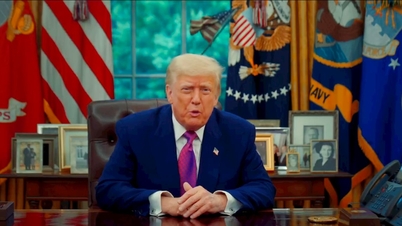At the top of that list is the upcoming US presidential election in November.
From the US presidential election…
The report stated: "In 2024, the United States faces further weakening. The US presidential election will exacerbate the country's political divisions, challenging American democracy to a degree it hasn't experienced in 150 years."
This stems from the fact that the American political system is "significantly divided," and not only that, but "public trust in core institutions – such as Congress , the judiciary, and the media – is at historically low levels," and "polarization and partisanship are at historically high levels," according to the Eurasia Group. And this division will only worsen in the run-up to the upcoming election.

Israeli forces in the Gaza Strip are shown in this photo released on January 21.
Internal political divisions within the US have profoundly impacted its policies toward allies and partners. This is exemplified by US policy toward Ukraine and Israel, given that the conflict in Ukraine has dragged on into its third year with no end in sight, and tensions in the Middle East are unlikely to ease anytime soon.
...to the "sparks" of tension
The report stated: "Kyiv has been dealt a severe blow by U.S. political support and aid to Ukraine. Americans are increasingly divided on the conflict, and many Republican lawmakers are actively opposing more aid. Even if Congress passes additional military aid for 2024, this will likely be the last significant allocation Kyiv will receive from Washington. If Donald Trump wins, he will drastically cut aid. If President Joe Biden wins, aid will remain difficult to obtain unless the Democrats control both the House and the Senate."
"U.S. support for Ukraine faces stronger headwinds from Capitol Hill, straining the transatlantic alliance." Kyiv might then take "reckless" actions to gain whatever it can before the next U.S. president takes office if Biden loses – which could lead to restrictions on aid. Conversely, the expectation that U.S. aid to Ukraine will end by 2025 could spur Russia to fight," the Eurasia Group report also stated.
In the Middle East, former President Donald Trump's prominent support for Israel and his willingness to attack Iran could further escalate regional tensions. Moreover, according to the Eurasia Group's assessment, the Middle East is no longer peaceful, and this peace is unlikely to last. "There is a network of deterrence relationships – on one side Israel and the US, on the other Iran and its proxy forces, and the Gulf states considered a 'third party' that has so far somewhat contained the conflict in the Gaza Strip. No country wants a regional war to break out," the report analyzes, arguing that the involvement of so many parties carries inherent risks. Therefore, the current fighting in Gaza may only be the first phase of a wider conflict expected in 2024. The risk of conflict escalation highlighted in the report is the possibility of Israel attacking Hezbollah forces in Lebanon, triggering a response from several pro-Iranian parties.
The economic picture is not bright.
In addition to political and security instability, the world in 2024 faces many other concerns, according to an assessment by Eurasia Group.
Among the prominent economic risks is the lack of a strong recovery in the mainland Chinese economy. As a crucial driving force, a weak recovery in the Chinese economy would significantly impact the global economy. However, according to the report, the recovery process of the Chinese economy is facing four major challenges.
Firstly, the growth trend following China's end of its zero-Covid policy is fading. The impetus from reopening in 2023 will disappear as growth slows and unemployment rises. Secondly, the real estate market, a pillar of the Chinese economy, remains very weak and shows no signs of significant recovery. Thirdly, key export markets for China, notably the US and Europe, remain sluggish, leading to decreased demand and severely impacting Chinese exports. Fourthly, China has yet to implement sufficiently convincing economic stimulus measures to attract investors.
Not only China, but the global economy as a whole is facing many difficulties. A report by the Eurasia Group assesses: "The global inflation shock that began in 2021 will continue to create strong economic and political drag in 2024. High interest rates due to inflation will slow growth worldwide." However, many countries have gone all-in on policy and even overused some policies, leading to potential risks in economic, social, and political spheres.
Furthermore, trade tensions will lead countries to implement protectionist measures that disrupt the flow of critical minerals, increasing price volatility and reshaping global supply chains. These minerals include essential raw materials for the semiconductor industry and the production of batteries for electric vehicles, among others.
Furthermore, one risk highlighted by the Eurasia Group is the peak of the El Niño climate phenomenon in the first half of 2024, leading to extreme weather conditions that result in food insecurity, increased water stress, logistical disruptions, disease outbreaks, fuel migration, and political instability.
All of these risks mean that the world will face many difficulties in 2024.

AI will continue to develop strongly in 2024.
Concerns about artificial intelligence (AI)
According to the report, gaps in AI governance will become apparent by 2024 as AI models and tools become far more powerful, beyond the control of governments.
Last year, the world witnessed an ambitious wave of AI, leading governments to announce policies and proposals for collaborative development of new AI standards. Many of the world's leading corporations committed to voluntary standards for AI development. The US, China, and most G20 members signed the Bletchley Declaration on AI safety. The White House issued an AI executive order. The EU also agreed on an AI Act…
However, breakthroughs in AI are developing faster than control measures. Furthermore, disagreements over control policies among countries lead to limitations in effective control. Moreover, the AI race could lead countries and technology corporations to circumvent regulations for commercial gain. Meanwhile, the downsides and potential risks of AI are all too clear. Therefore, despite control measures and promising benefits, AI still poses significant risks to the world.
Source link





![[Photo] Prime Minister Pham Minh Chinh visits and extends New Year greetings to former Party and State leaders and offers incense to the esteemed predecessors.](https://vphoto.vietnam.vn/thumb/1200x675/vietnam/resource/IMAGE/2026/02/14/1771078465521_dsc-2411-jpg.webp)



































































































Comment (0)